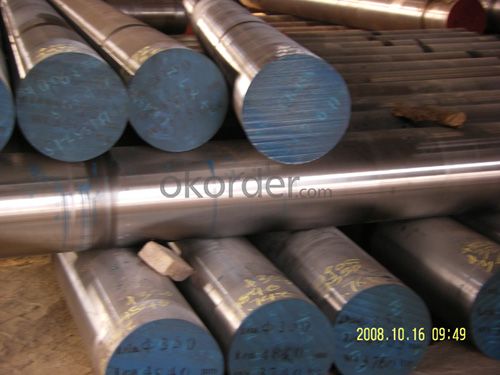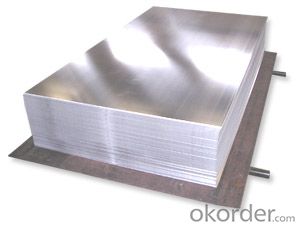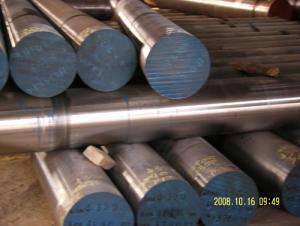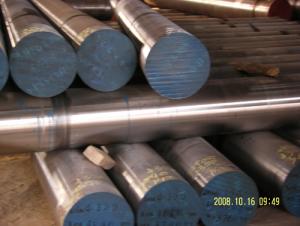SUS 316L Stainless High Quality Tool Steel
- Loading Port:
- China main port
- Payment Terms:
- TT or LC
- Min Order Qty:
- 25 m.t.
- Supply Capability:
- 10000 m.t./month
OKorder Service Pledge
OKorder Financial Service
You Might Also Like
Product Description:
OKorder is offering Tool Steel at great prices with worldwide shipping. Our supplier is a world-class manufacturer of steel, with our products utilized the world over. OKorder annually supplies products to European, North American and Asian markets. We provide quotations within 24 hours of receiving an inquiry and guarantee competitive prices.
Product Applications:
High Quality Bearing steel is used for manufacturing ball, roller bearing steel and rings. Bearing in work is under great pressure and friction, so have high demands bearing steel and hardness and resistance, and high elastic limit.
Bearing steels are used for ball and roller bearing applications and are comprised of low carbon steels and high carbon through harden able steel.
For example, bearing ring, steel rolling mill, machinery, 100Cr6 bearing steel ball is widely used in high-speed and low-noise bearing, bicycle, motorcycle, automobile, bags electronically.
Product Advantages:
OKorder's Tool Steel are durable, strong, and resist corrosion.
Main Product Features:
· Premium quality
· Prompt delivery & seaworthy packing (30 days after receiving deposit)
· Corrosion resistance
· Can be recycled and reused
· Mill test certification
· Professional Service
· Competitive pricing
Product Specifications:
Grade | bearing steel EN-31 |
Dimensions | Diameter: 20-280mm Length: 2000-5800mm |
Shape | Round Bar |
Type | High chromium bearing steel |
HBS | <220< span=""> |
Standard | AISI |
Technique | Hot Rolled |
Chemical Composition of High Quality Bearing Steel
C | S | P | Si | Mn |
0.95-1.05 | ≤0.025 | ≤0.025 | 0.15-0.35 | 0.25-0.45 |
Cr | Mo | Ni | Cu | Ni+Cu |
1.40-1.65 | ≤0.10 | ≤0.30 | ≤0.25 | ≤0.50 |
FAQ:
Q1: Why buy Materials & Equipment from OKorder.com?
A1: All products offered byOKorder.com are carefully selected from China's most reliable manufacturing enterprises. Through its ISO certifications, OKorder.com adheres to the highest standards and a commitment to supply chain safety and customer satisfaction.
Q2: How do we guarantee the quality of our products?
A2: We have established an advanced quality management system which conducts strict quality tests at every step, from raw materials to the final product. At the same time, we provide extensive follow-up service assurances as required.
Q3: How soon can we receive the product after purchase?
A3: Within three days of placing an order, we will begin production. The specific shipping date is dependent upon international and government factors, but is typically 7 to 10 workdays.
Images:


- Q:What are the advantages of using nickel-molybdenum alloy steel round bars?
- There are several advantages of using nickel-molybdenum alloy steel round bars: 1. High strength and durability: Nickel-molybdenum alloy steel round bars have excellent strength and durability properties, making them suitable for use in high-stress applications. They can withstand heavy loads and provide long-lasting performance. 2. Corrosion resistance: The addition of nickel in the alloy enhances its corrosion resistance, making it resistant to various corrosive environments. This makes nickel-molybdenum alloy steel round bars ideal for use in industries where exposure to chemicals or moisture is common, such as the oil and gas industry or marine applications. 3. High temperature resistance: Nickel-molybdenum alloy steel round bars exhibit excellent heat resistance properties, allowing them to maintain their mechanical strength and structural integrity at high temperatures. This makes them suitable for use in applications where elevated temperatures are present, such as heat exchangers or power generation equipment. 4. Excellent machinability: Nickel-molybdenum alloy steel round bars can be easily machined and fabricated, allowing for various customization options. This makes them versatile and easily adaptable to different project requirements. 5. Weldability: These alloy steel round bars have good weldability, which means they can be easily joined to other components or structures using standard welding techniques. This makes them convenient for manufacturing processes and construction projects. 6. Cost-effective: Despite their excellent properties, nickel-molybdenum alloy steel round bars are relatively cost-effective compared to other high-performance alloys. This makes them a cost-efficient choice for various applications, providing value for money without compromising on quality. Overall, the advantages of using nickel-molybdenum alloy steel round bars include high strength, corrosion resistance, temperature resistance, machinability, weldability, and cost-effectiveness. These properties make them a preferred choice for various industries and applications where superior performance and durability are required.
- Q:What are the different types of surface defects that can occur in steel round bars?
- Steel round bars can experience multiple types of surface defects. Some of the most frequently encountered defects include the following: 1. Scratches: These shallow grooves or marks on the round bar's surface occur due to friction or contact with sharp objects during handling or transportation. 2. Pitting: Small, localized cavities or depressions on the surface are caused by corrosion or exposure to harsh environments. If left unaddressed, pitting can lead to further corrosion. 3. Scale: During the manufacturing process, a thin layer of oxide or impurities, known as scale, can form on the surface of steel round bars. Although it affects appearance and quality, scale is often removed during subsequent processing or cleaning. 4. Scabs: Irregularly shaped protrusions or raised areas on the surface result from solidification or cooling issues during the casting process. Proper attention is required to ensure the strength and integrity of the bar. 5. Roll marks: Elongated depressions or ridges on the surface are caused by uneven or improper rolling during manufacturing. Roll marks can impact the dimensional accuracy of the bar and may necessitate additional processing or grinding for removal. 6. Laminations: Sometimes visible on the surface, laminations are internal defects resulting from improper bonding or separation of layers during the steelmaking process. They can weaken the bar and reduce its load-bearing capacity. 7. Inclusions: Non-metallic particles or impurities can become trapped in the steel during manufacturing, appearing as dark spots or irregularities on the round bar's surface. Inclusions can affect the bar's mechanical properties. It is essential to recognize that the severity and impact of these surface defects may vary. Manufacturers and quality control personnel employ diverse inspection techniques to identify and mitigate these defects, ensuring the quality and reliability of the final product.
- Q:What are the tolerance levels for steel round bars?
- Tolerance levels for steel round bars vary depending on the specific application and industry standards. Steel round bars are typically produced with tight dimensional tolerances to ensure their precise diameter, straightness, and surface finish. Common tolerance levels for steel round bars include diameter tolerances, straightness tolerances, and surface finish tolerances. Diameter tolerances specify the acceptable range of deviation from the nominal diameter of the round bar. This tolerance is usually expressed as a plus or minus value, such as +/- 0.005 inches. The specific tolerance will depend on the size and type of steel round bar being produced, as well as the requirements of the application. Straightness tolerances refer to the allowable amount of deviation from a perfectly straight line along the length of the round bar. This tolerance is typically expressed in terms of the maximum distance between the round bar and a straight edge placed along its length. For example, a straightness tolerance of 0.030 inches per foot means that a one-foot section of the round bar can deviate up to 0.030 inches from a straight line. Surface finish tolerances specify the acceptable level of imperfections or irregularities on the surface of the round bar. This tolerance is often expressed in terms of roughness average (Ra) or roughness peak (Rz) values. The specific tolerance will depend on the desired surface finish and the application requirements. It is important to note that tolerance levels may also be subject to industry-specific standards, such as those set by organizations like the American Society for Testing and Materials (ASTM) or the International Organization for Standardization (ISO). These standards provide guidelines and specifications for various steel products, including round bars, to ensure consistent quality and performance. Ultimately, determining the tolerance levels for steel round bars involves considering the specific application requirements, industry standards, and the capabilities of the manufacturing process.
- Q:What are the advantages of using spring steel round bars?
- There are several advantages of using spring steel round bars: 1. High strength: Spring steel round bars are known for their exceptional strength. They are designed to withstand high levels of stress and strain, making them ideal for applications that require strong and durable materials. 2. Flexibility: Spring steel round bars have excellent flexibility, allowing them to be easily shaped, bent, or formed without losing their strength. This flexibility makes them suitable for various manufacturing processes and applications. 3. Superior elasticity: Spring steel round bars possess excellent elasticity, enabling them to return to their original shape after being subjected to deformation or stress. This elasticity is crucial in applications where materials need to absorb shocks or vibrations. 4. Resistance to fatigue: Spring steel round bars are highly resistant to fatigue and can withstand repeated cycles of loading and unloading without losing their mechanical properties. This resistance to fatigue ensures their reliability and longevity, making them suitable for demanding applications. 5. Excellent toughness: Spring steel round bars exhibit exceptional toughness, which means they can withstand sudden impact or heavy loads without breaking or fracturing. This characteristic makes them suitable for applications that require materials to withstand harsh environments or heavy-duty operations. 6. Corrosion resistance: Many spring steel round bars are made from corrosion-resistant alloys, providing protection against rust and other forms of corrosion. This corrosion resistance makes them suitable for applications where exposure to moisture or corrosive substances is expected. 7. Cost-effective: Spring steel round bars offer a cost-effective solution compared to other types of steel or materials. Their durability and longevity reduce the need for frequent replacements, ultimately saving costs in the long run. In summary, the advantages of using spring steel round bars include high strength, flexibility, superior elasticity, resistance to fatigue, excellent toughness, corrosion resistance, and cost-effectiveness. These properties make them a preferred choice in various industries, including automotive, construction, manufacturing, and aerospace.
- Q:How are steel round bars used in the construction of dams and reservoirs?
- Steel round bars are commonly used in the construction of dams and reservoirs for reinforcement purposes. These bars are typically embedded within the concrete structures to enhance their strength and durability. The steel round bars act as a framework, providing structural integrity and preventing cracks or deformations in the concrete. This reinforcement ensures that the dam or reservoir can withstand the immense pressure and load exerted by the water, making them an essential component in the construction process.
- Q:Embedded bolts M24 why use M25 round steel?
- Because M25 round steel machine processing, the direct use of M24 round steel accuracy is not guaranteed
- Q:Are steel round bars suitable for use in the marine industry?
- Yes, steel round bars are suitable for use in the marine industry. Steel is a highly durable and strong material, making it ideal for marine applications where there is exposure to harsh environmental conditions such as saltwater, waves, and corrosion. Steel round bars offer excellent tensile strength and resistance to impact, making them suitable for various marine components like shipbuilding, offshore structures, and marine equipment. Additionally, steel is also readily available, cost-effective, and can be easily fabricated to meet specific requirements, making it a popular choice in the marine industry. However, it is important to select the appropriate grade of steel that has good corrosion resistance, such as stainless steel, to ensure long-term durability and performance in marine environments. Regular maintenance, including proper coating and protection against corrosion, is also crucial to enhance the lifespan of steel round bars in marine applications.
- Q:What is the difference between a forged and a ground steel round bar?
- A forged steel round bar is made by heating and shaping the steel through a process called forging, which involves applying extreme pressure to shape and compress the metal. This process enhances the strength and durability of the steel, making it suitable for applications that require high strength and resistance to wear and impact. On the other hand, a ground steel round bar is produced by removing material from the surface of a steel bar using grinding or machining processes. This results in a precise diameter and smooth surface finish, making it ideal for applications that require tight tolerances and a polished appearance. In summary, the main difference between a forged and a ground steel round bar lies in their manufacturing processes and resulting properties. Forged steel offers superior strength and toughness, while ground steel provides precise dimensions and a refined surface finish.
- Q:What are the advantages of using nickel-chromium-molybdenum alloy steel round bars?
- The advantages of using nickel-chromium-molybdenum alloy steel round bars include high strength, excellent corrosion resistance, good toughness, and superior heat resistance. These properties make the alloy steel bars ideal for applications in industries such as aerospace, oil and gas, and chemical processing, where durability and reliability are crucial. Additionally, the alloy's resistance to oxidation and high-temperature environments makes it suitable for use in high-stress applications, such as turbine engine components and pressure vessels.
- Q:Are steel round bars suitable for the production of valves?
- Yes, steel round bars are suitable for the production of valves. Steel is a commonly used material in valve manufacturing due to its excellent mechanical properties, such as high strength, durability, and resistance to corrosion. Steel round bars can be easily machined and formed into various valve components, providing the necessary strength and stability required for valves to withstand high pressure and temperature conditions. Additionally, steel round bars can be heat-treated to enhance their mechanical properties, further improving the performance and reliability of valves. Overall, steel round bars are a suitable choice for the production of valves, ensuring their functionality and longevity in various industries and applications.
1. Manufacturer Overview |
|
|---|---|
| Location | |
| Year Established | |
| Annual Output Value | |
| Main Markets | |
| Company Certifications | |
2. Manufacturer Certificates |
|
|---|---|
| a) Certification Name | |
| Range | |
| Reference | |
| Validity Period | |
3. Manufacturer Capability |
|
|---|---|
| a)Trade Capacity | |
| Nearest Port | |
| Export Percentage | |
| No.of Employees in Trade Department | |
| Language Spoken: | |
| b)Factory Information | |
| Factory Size: | |
| No. of Production Lines | |
| Contract Manufacturing | |
| Product Price Range | |
Send your message to us
SUS 316L Stainless High Quality Tool Steel
- Loading Port:
- China main port
- Payment Terms:
- TT or LC
- Min Order Qty:
- 25 m.t.
- Supply Capability:
- 10000 m.t./month
OKorder Service Pledge
OKorder Financial Service
Similar products
New products
Hot products
Related keywords

































